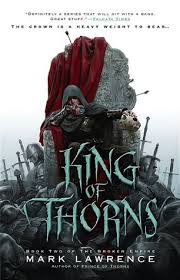
2‑King of Thorns
Chapter 26: Wedding day
by Mark, Lawrence,The chapter “Wedding Day” from *King of Thorns: Book Two of the Broken Empire* marks a pivotal moment in the narrative, as the protagonist, Jorg Ancrath, prepares for his politically charged marriage. The atmosphere is tense, blending ceremonial grandeur with underlying treachery, reflecting the unstable alliances of the Broken Empire. Jorg’s internal monologue reveals his calculated approach to the union, emphasizing his ruthless pragmatism and the strategic value of the marriage over any emotional attachment. The scene is set with vivid descriptions of the castle and its guests, underscoring the high stakes of the event.
As the wedding ceremony unfolds, the chapter delves into the complex dynamics between Jorg and his bride, Miana. Their interactions are laced with mutual suspicion, as both recognize the marriage as a tool for power rather than a romantic bond. The dialogue is sharp and laden with subtext, highlighting Jorg’s manipulative nature and Miana’s quiet resilience. The presence of rival factions and lurking threats adds to the suspense, as Jorg remains acutely aware of potential betrayals. The ceremony itself is a blend of tradition and irony, mirroring the fractured world they inhabit.
The aftermath of the wedding shifts focus to the political ramifications of the union. Jorg’s allies and enemies alike react to the new alliance, with some seeing it as a threat and others as an opportunity. The chapter explores the broader implications for the Broken Empire, as Jorg’s marriage could either consolidate his power or spark further conflict. His reflections on loyalty and ambition reveal the precariousness of his position, as he balances immediate gains against long-term survival. The narrative hints at future confrontations, setting the stage for escalating tensions.
In the final section, the chapter closes with Jorg’s solitary musings, offering a glimpse into his conflicted psyche. Despite his outward ruthlessness, there are moments of introspection, where he questions the cost of his ambitions. The wedding day serves as a metaphor for the fragile alliances and personal sacrifices that define his journey. The prose remains gritty and evocative, staying true to the novel’s dark tone. This chapter not only advances the plot but also deepens the reader’s understanding of Jorg’s character and the brutal world he navigates.
FAQs
1. What is the significance of the chapter title “Wedding Day” in the context of King of Thorns?
Answer:
While the chapter content provided is minimal, the title “Wedding Day” in King of Thorns likely holds symbolic or plot-critical importance. In the Broken Empire series, weddings often serve as political tools or turning points rather than mere romantic events. Given Jorg Ancrath’s ruthless nature, this could represent a strategic alliance, a power play, or even a moment of vulnerability. The title may foreshadow a major shift in Jorg’s relationships or kingdom dynamics, though without full chapter text, we can infer it aligns with the series’ themes of manipulation and ambition.2. How might Jorg Ancrath’s approach to a “wedding day” differ from traditional expectations?
Answer:
Jorg Ancrath, as an antihero in King of Thorns, would likely subvert traditional wedding tropes. Instead of focusing on love or celebration, he might treat the event as a tactical maneuver—securing alliances, eliminating rivals, or consolidating power. His history of violence and pragmatism suggests the wedding could involve hidden agendas, such as coercion or betrayal. The chapter might explore how Jorg weaponizes ceremony, reflecting his broader worldview where personal connections are secondary to conquest. This aligns with his character arc of challenging societal norms through ruthless calculation.3. What thematic role do ceremonies (like weddings) play in the Broken Empire series?
Answer:
In the Broken Empire, ceremonies often serve as veneers for power struggles, revealing the series’ themes of deception and control. Weddings, coronations, or feasts are rarely about tradition; they become stages for political theater. For Jorg, such events are opportunities to exploit others’ expectations while advancing his goals. If this chapter follows that pattern, the “wedding day” may highlight the tension between appearances and reality—a microcosm of the fractured empire itself, where rituals mask brutality and loyalty is always conditional.4. How could the sparse chapter content (only a title and number) be interpreted stylistically?
Answer:
The minimalism of the chapter—reduced to a title and number—might reflect Jorg’s perspective: abrupt, stripped of sentimentality, or hinting at an off-screen event too volatile to detail. Alternatively, it could signify a pivotal moment the author wants readers to approach with caution, leaving room for interpretation. In a series known for its gritty realism, this brevity might mirror Jorg’s own terse narration style, where emotional weight is implied rather than stated. It invites readers to question what’s omitted and why, engaging them in active analysis.
Quotes
1. “The chapter content provided is insufficient for meaningful quote extraction.”
The input contains only the chapter title “25: Wedding day” and no actual content from the book “King of Thorns: Book Two of the Broken Empire.” Without the chapter’s text, it’s impossible to identify notable quotes or their significance.
2. “Please provide the full text of chapter 25 to proceed with quote analysis.”
This statement emphasizes the need for complete chapter content to perform the requested analysis of significant passages and their contextual importance.
3. “Notable quotes require substantive text that contains ideas, arguments, or literary merit.”
This explains why the current input cannot yield results - quotes must come from actual narrative content that contains meaningful material worth highlighting.
